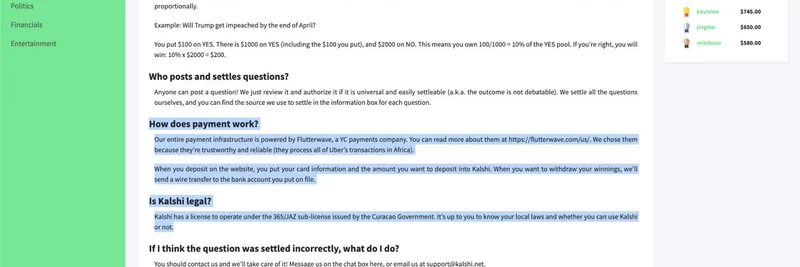In the fast-paced world of blockchain and crypto, where innovation meets regulation, drama often unfolds on social media. A recent tweet from @tomkysar has stirred up the community by calling out Kalshi, a popular prediction market platform, for what he describes as "revisionist history." Let's break this down and see why it matters for anyone interested in meme tokens and the broader crypto ecosystem.
Prediction markets are essentially betting platforms where users wager on the outcomes of real-world events, like elections, sports results, or even celebrity news. They're a big deal in crypto because they blend finance with speculation, often powering viral meme tokens tied to hot topics. Think of platforms like Polymarket, which runs on blockchain and has become a go-to for crypto enthusiasts betting on everything from politics to pop culture.
Kalshi, on the other hand, positions itself as a regulated alternative, operating under U.S. laws with approval from the Commodity Futures Trading Commission (CFTC). Recently, Kalshi's Head of Crypto, @j0hnwang, shared a clip from an interview where co-founder Tarek Mansour claimed Kalshi started "onchain" as a crypto-first company during their Y Combinator days. According to Mansour, they had to pivot offchain because it was "illegal" at the time, enduring a three-year battle to legalize their operations.
But @tomkysar wasn't buying it. In his tweet, he fired back, accusing Kalshi of rewriting their story to appeal to the crypto crowd. He pointed out that Kalshi actually launched with a gambling license from Curacao—a jurisdiction famous for its lax regulations on online betting—and had "nothing to do with crypto." Even more damning, he alleged that their strategy involved lobbying against crypto competitors to clear the path for their centralized model.
To back it up, @tomkysar shared a screenshot from the Wayback Machine archiving Kalshi's old FAQ page. It clearly states that Kalshi operated under a "365/JAZ sub-license issued by the Curacao Government," emphasizing their focus on traditional payments and distancing from anything crypto-related.
This revelation has sparked reactions across Crypto Twitter (CT), with users like @Darrenlautf calling for more scrutiny and others joking about Kalshi trying to "fit in" with the decentralized crowd. It's a classic case of centralized finance (CeFi) clashing with decentralized ideals, especially as prediction markets heat up ahead of major events like the 2024 U.S. elections—wait, make that 2028, given the date.
Why This Matters for Meme Tokens
Meme tokens thrive on hype, controversy, and community narratives. This Kalshi drama could fuel new memes or tokens poking fun at regulatory hypocrisy. For instance, we've seen tokens like $POLY (inspired by Polymarket) surge during election seasons, capitalizing on prediction market buzz. If Kalshi's pivot to embrace crypto feels insincere, it might boost onchain alternatives, leading to more meme-driven liquidity and trading volumes.
In the blockchain space, trust is everything. Stories like this remind us to dig into a project's history—whether it's a meme coin or a regulated platform. As meme token enthusiasts, staying informed helps spot opportunities, like betting on underdog narratives or avoiding rug pulls disguised as legit ventures.
The Bigger Picture in Blockchain
This isn't just shade-throwing; it highlights the ongoing tension between regulation and innovation. Crypto-native prediction markets like Augur (which @tomkysar has experience with) pioneered onchain betting but faced legal hurdles. Kalshi's success in getting CFTC approval is a win for accessibility, but if their origins involved anti-crypto lobbying, it raises questions about fair play.
For blockchain practitioners, this is a lesson in resilience. Meme tokens often start as jokes but evolve into serious communities, much like how prediction markets have grown from niche bets to multimillion-dollar ecosystems. Keep an eye on how this plays out— it could influence future regulations and inspire the next wave of meme-inspired DeFi tools.
If you're diving into meme tokens or prediction markets, tools like DexScreener for tracking or CoinMarketCap for news can be invaluable. Stay curious, stay skeptical, and as always, DYOR (do your own research). What's your take on this Kalshi saga? Drop a comment below!


